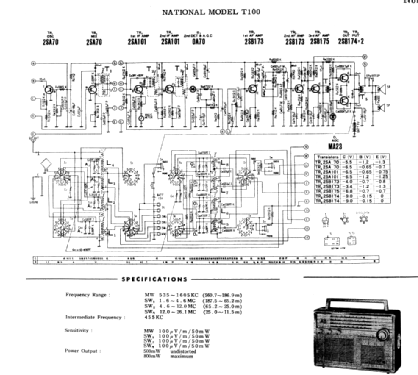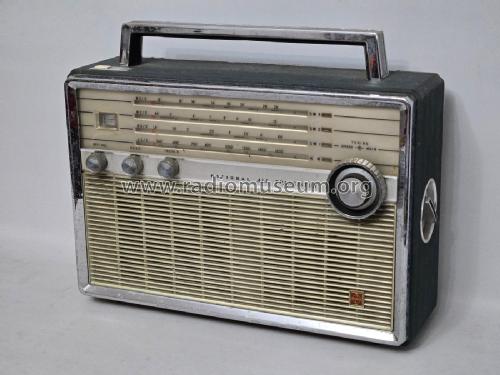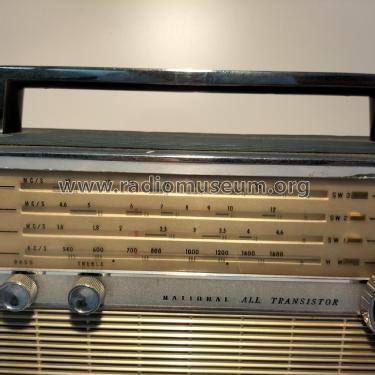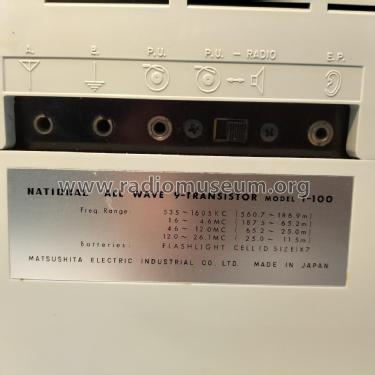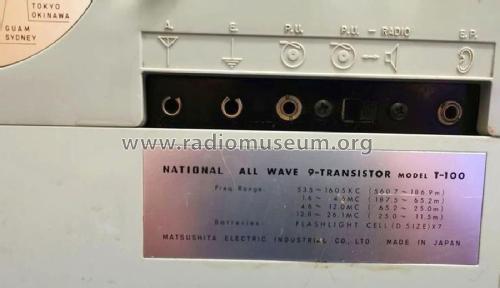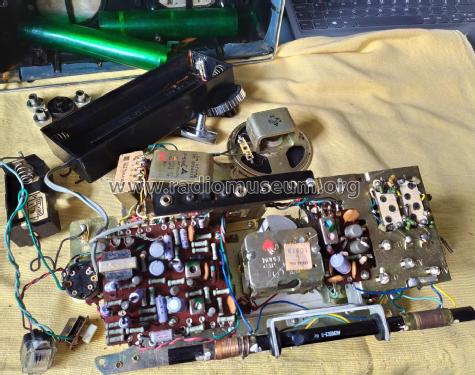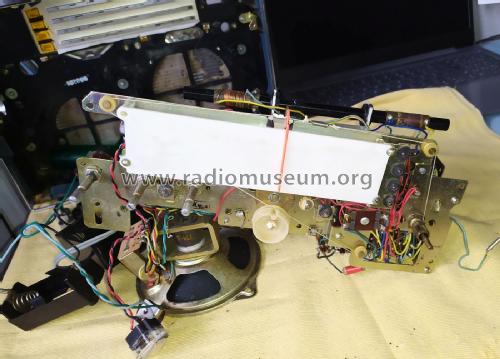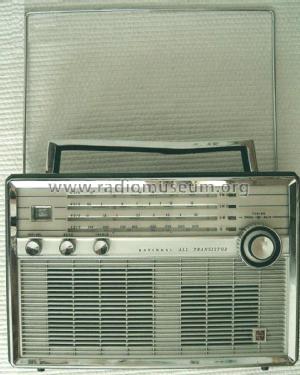National All Transistor All Wave 4-Band 9-Transistor T-100
Panasonic, Matsushita, National ナショナル (also tubes); Osaka
- Paese
- Giappone
- Produttore / Marca
- Panasonic, Matsushita, National ナショナル (also tubes); Osaka
- Anno
- 1963–1965
- Categoria
- Radio (o sintonizzatore del dopoguerra WW2)
- Radiomuseum.org ID
- 122378
Clicca sulla miniatura dello schema per richiederlo come documento gratuito.
- Numero di transistor
- 9
- Principio generale
- Supereterodina (in generale); ZF/IF 455 kHz
- Gamme d'onda
- Onde medie (OM) e più di 2 gamme di onde corte (> 2 x OC).
- Tensioni di funzionamento
- Batterie a secco / D: 6 x 1.5 & D: 1 x 1.5 for light Volt
- Altoparlante
- 2 altoparlanti
- Potenza d'uscita
- 0.5 W (0.8 W max.)
- Materiali
- Plastica (non bachelite o catalina)
- Radiomuseum.org
- Modello: National All Transistor All Wave 4-Band 9-Transistor T-100 - Panasonic, Matsushita,
- Forma
- Apparecchio portatile > 20 cm (senza la necessità di una rete)
- Dimensioni (LxAxP)
- 13.5 x 10.75 x 4.875 inch / 343 x 273 x 124 mm
- Annotazioni
-
National Model T-100 is a nine transistor, two diode, four-band AM receiver.
Magic-meter for precise tuning, two-way sound with 5" and 3½" PM dynamic speakers, separate bass and treble controls, fine tuning control, magnetic antenna (internal) and a stand type frame antenna for shortwave reception, internal Magnetic antenna and a stand type frame antenna for shortwave reception, socket for connection of record player and external speaker box, dial light for tuning in the dark, dedicated 1.5V battery for dial lights.
Frequency ranges:
SW3: 12 - 26.1 MHz
SW2: 4.6 - 12 MHz
SW1: 1.6 - 4.6 MHz
MW: 535 - 1605 kHzIn addition to the other variants specified below, model T-100 exists in at least 3 variations combined here, with unknown technical differences. They differ in the type sticker:
- National 4-Band 9-Transistor, specifying the battery for dial light
- National All Wave 9-Transistor, specifying the battery for dial light
- National All Wave 9-Transistor, specifying 7 batteries
Several other model versions were produced, with different frequency ranges and/or for other markets. Technical differences see below:
National Panasonic World-Wide T-100D
- AM, 9 transistors, 2 diodes
- no dedicated 1.5 V battery for dial light
- Record Out jack instead of a Radio/Pick Up selector Switch
- the radio/phono selection is done at the Pick Up jack itselfFrequency ranges:
SW3: 12 - 26.1 MHz
SW2: 4.5 - 12.0 MHz
SW1: 1.6 - 4.5 MHz
MW: 525 - 1605 kHzNational Panasonic T-100F
- FM-AM, 12 transistors, 5 diodes
- telescopic antenna instead of frame loop antennaFrequency ranges:
FM: 87 - 108 MHz
SW: 5.9 - 18.0 MHz
MW: 520 - 1610 kHz
LW: 150 - 300 kHzPanasonic T-100MD (also as National Panasonic T-100MD)
- FM-AM, 12 transistors, 5 diodes
- telescopic antenna instead of frame loop antenna.Frequency ranges:
FM: 87 - 108 MHz
SW: 5.9 - 18.0 MHz
MB: 1.6 - 4.5 MHz
MW: 525 - 1605 kHzNational Panasonic World-Wide T-100Y
- FM-AM, 12 transistors, two versions: 6 diodes + 5 diodes
- telescopic antenna instead of frame loop antennaFrequency ranges:
FM: 87 - 108 MHz
SW2: 7 - 22 MHz
SW1: 2.3 - 7 MHz
MW: 525 - 1605 kHz
- Peso netto
- 10 lb 6 oz (10.375 lb) / 4.710 kg
- Prezzo nel primo anno
- 359.00 DM
- Bibliografia
- Mingay's Price Service (Feb 1963 to Aug 1966.)
- Letteratura / Schemi (1)
- J.R. Publications Transistor Radio Service Handbook (E Series Handbook, Page N52.)
- Autore
- Modello inviato da un iscritto da A. Utilizzare "Proponi modifica" per inviare ulteriori dati.
- Altri modelli
-
In questo link sono elencati 3131 modelli, di cui 2915 con immagini e 651 con schemi.
Elenco delle radio e altri apparecchi della Panasonic, Matsushita, National ナショナル (also tubes); Osaka
Collezioni
Il modello National All Transistor All Wave 4-Band 9-Transistor fa parte delle collezioni dei seguenti membri.
Letteratura
Il modello National All Transistor All Wave 4-Band 9-Transistor è documentato nella seguente letteratura.
Discussioni nel forum su questo modello: Panasonic,: National All Transistor All Wave 4-Band 9-Transistor T-100
Argomenti: 2 | Articoli: 2
Es mag sein, dass es die Worte für die Geräusche gar nicht gibt: Schnarren, Rischeln und Rauscheln… Das Radio aber macht sie!
Wie der alte Reparaturbericht erzählt: das Radio hat schon eine Neigung zum Rauschen gehabt, als es 2016 zu mir gekommen ist. Ich habe es weggestellt – mit Batterien eingelegt! – und jetzt ist es wieder hervorgekommen. Die Todsünde – Batterien im Gerät gelassen – hat sich aber nicht mit Auslaufen gerächt.
Doch was ist das? Nach dem Einschalten, nur etwa zwei Minuten danach, fängt das Gerät an, laut zu Schnarren, was schliesslich in Gebrüll übergeht. Das verschwindet, wenn man die Lautstärke voll aufdreht – aber wer will schon Radio hören in Turnierlautstärke?
Nach einem Blick entscheidet der Meister: Kondensator-Kur! Die Elektrolyten müssen allesamt raus. Da man die Platine nicht herausnehmen will, weil man faul ist, und weil man fürchtet, unten beengte Verhältnisse anzutreffen, macht man das von oben herab. Das hat den Vorteil, dass man einen Kondensator nach dem anderen austauschen kann, und zwischenzeitlich immer eine Prüfung möglich ist. Das laute Schnarren, das Gebrüll, sie sind schnell im Radiohimmel. Wenn man das Gerät aber ausschaltet, jault es ganz fürchterlich. Ebenso tritt überlautes Rischeln und Rascheln und Rauschen auf, wenn das Radio zehn, fünfzehn Minuten läuft.
Gibt es noch mehr Elektrolyten? – Was hilft es, man muss unter der Platine nachsehen: und richtig! Hier ist noch einer von 100uF versteckt! Den ersetzt: man kann das Gerät ohne Misston ausschalten. Damit wäre alles in Ordnung.
Alles in Ordnung? – Nach zehn, fünfzehn Minuten macht sich Rischeln und Rascheln, Rauschen bemerkbar. Der Verdacht richtet sich auf die 3 Vorverstärker-Transistoren. Transistor 7, der 2SB175B, ist der Hauptverdächtige – hat er an seinem Hut doch eine Spannung von 7V. An seine Stelle tritt ein AC151. Wunderbar ruhig ist der Empfang, bis er… bis die zehn à fünfzehn Minuten vorbei sind.
Transistor 5 oder 6? – Auf welchen fällt die Wahl? – Kältespray würde helfen. Doch der ist alle. Da fällt den forschenden Fingerlein noch eine halbvolle Sprühdose in die Hände, mit verlorengegangenem Sprühkopf. Mit Klugheit und mit einer Zange lässt sich die doch noch verwenden, und siehe da: T6 ist schadhaft. Es fliegt hinaus der 2SB173B, hinein kommt ebenfalls ein AC151.
Der Meister fällt aber nicht noch einmal hinein: zu oft hat sich das Rischeln und Rascheln, das Rauschen und Knistern, lange zurückgehalten. Den ganzen Nachmittag betreibt er also sein Radio, ganz geduldig, wie es zum ersten Mal seit Jahren auch nach den zehn bis fünfzehn Minuten anständig weiterläuft.
Seht ihn Euch an, wie er da hingebungsvoll der Mittelwelle lauscht: echte japanische High Fidelity aus dem Jahre 1964! - Wäre es heute tatsächlich 1964 und nicht 2024, es erschiene die ganze Welt!
Bruce Cohen, 25.Dec.24
Schaltbilder für T-100D und T-100Y hochgeladen. Die Darstellungen sind unterschiedlich. Bei einer Reparatur bitte beide Varianten beachten.
MfG DR
Dietmar Rudolph † 6.1.22, 01.Sep.08
